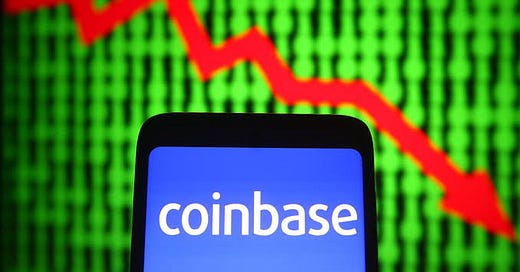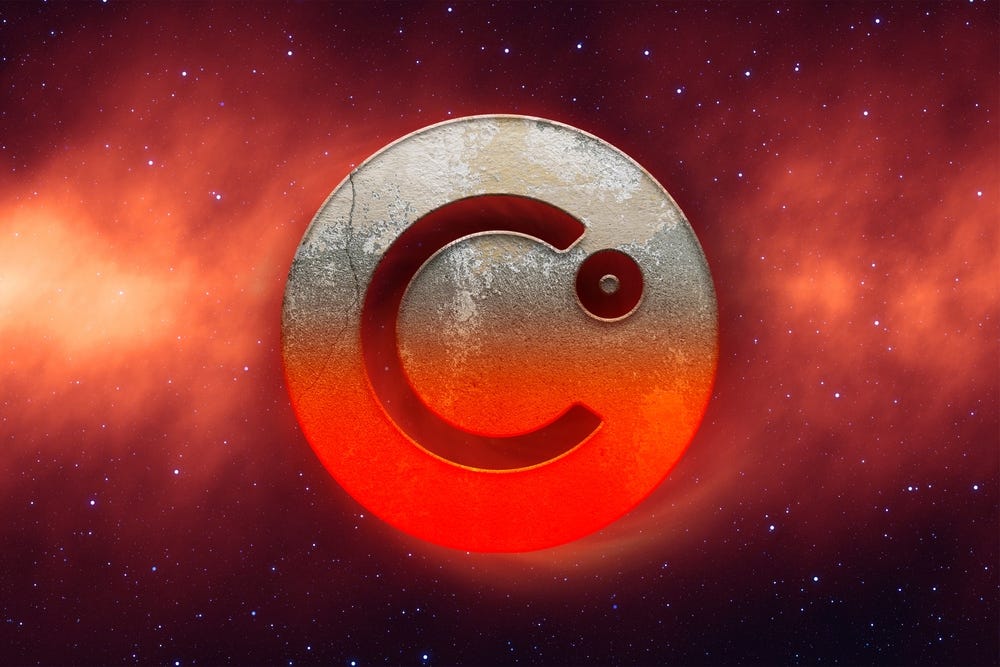Last week, we saw the good, the bad, and deceptive as Ethereum's Goerli testnet merge proved a success, Coinbase announced a shocking $1.1 billion net loss in Q2 and Celsius Network was denied the opportunity to sell its Bitcoin holdings. However, an Anonymous group "plays a prank" on celebrities, sending them ETH from sanctioned Tornado Cash protocol, while a lawsuit against Voyager CEO and Mark Cuban claims they endorsed a "Ponzi scheme"
Coinbase announce $1.1Bn Loss in Q2 amid "Fast and Furious" crypto downturn
The world's largest cryptocurrency exchange, Coinbase, blamed a "fast and furious" decline in the cryptocurrency markets for its stunning $1.1 billion net loss in the second quarter of 2022, which also saw a decline in trading volume and transaction income.
The cryptocurrency company has lost money for the last two quarters in a row, and this one marks the biggest loss since it went public on the Nasdaq in April 2021.
The outcomes, which fell short of analyst forecasts as well, were disclosed in a Q2 2022 Shareholder Letter from Coinbase on Tuesday, stating:
“The current downturn came fast and furious, and we are seeing customer behavior mirror that of past down markets.”
According to Coinbase, Q2 was a "difficult quarter," with sequential trading volume and transaction income both declining by 35%.
Both metrics were influenced by a shift in customer and market activity, driven by macroeconomic and crypto credit factors alike,” the firm wrote.
Although Coinbase did not experience a widespread exodus from its platform, Morningstar equity analyst Michael Miller stated in a report to Reuters that "its users are becoming more passive in their cryptocurrency investing."
The cryptocurrency exchange recorded revenue of $802.6 million, a startling 153.1% decrease from the same quarter last year and a loss of 45.1% from the previous quarter. Its $1.1 billion net loss was mostly the result of $446 million in non-cash impairment charges brought on by lower crypto asset values in Q2.
However, the company noted that despite the economic crisis, the business is making every effort to adapt to shifting market conditions.
In June, Coinbase laid off 18% of its workforce in an effort to reduce costs and increase profit margins. Coinbase has also prioritized product development while pausing other projects.
“Overall, it will take some time to fully realize the financial impact of our actions, but we have lowered our full-year expense range for Technology & Development and General & Administrative expenses.”, the company added.
Moving forward, the "soft crypto market conditions" from the second quarter are anticipated to persist into Q3 2022, according to a statement from Coinbase. The business predicted a further decline in total trading volume and average transaction revenue per user, but said that subscription and service fees might see some revenue rise.
Following the disclosure of its Q2 data on Tuesday, the price of Coinbase's stock dropped 10.55%, and it is currently trading at $87.68 at the time of writing.
Ethereum Merge moves a step closer as Goerli Testnet merge success
Last week, a significant milestone toward Ethereum's goal of switching to a Proof-of-Stake blockchain was reached.
The third and last testnet, Goerli, has now successfully shifted to this consensus process in what has been referred to as the last dress rehearsal before the eagerly anticipated merge next month.
Years have been spent preparing for the switch to proof-of-stake, which has been marketed as more scalable and ecologically benign than proof-of-work.
Since the successful test was announced, ether has increased by 11%, reaching a high of $1,908.20 at one point.
However, Ethereum engineer Marius van der Wijden did acknowledge that there were a few minor delays after Goerli's merging, explaining:
"There was some confusion on the network because of two different terminal blocks and lots of non-updated nodes, so we didn't finalize earlier. We're still looking into what's happening, but so far it looks quite good."
However, there was plenty for Ethereum enthusiasts to celebrate, with Giulio Rebuffo tweeting:
"Goerli is finally done. And with this, all testnets are merged, now onto the final boss."
With the Ethereum Foundation stating that this testnet is most similar to the mainnet, Goerli "has a robust community and a lot of current infrastructure backing it," making this milestone all the more noteworthy.
What to expect from the Ethereum merge?
The long-delayed merging scheduled for next month will mark the end of mining on the Ethereum blockchain.
Instead, confirming transactions will fall to validators who stake 32 ETH.
This should consume a lot less energy than the current system and pave the way for future improvements that will increase the amount of transactions the Ethereum network can support.
The developers' next stop is to confirm the date of the merge because Goerli was named after a Berlin train station.
On Friday, as the merge was being broadcast live by Bankless, there were joyful scenes. Ethereum co-founder Vitalik Buterin was in attendance, and Song A Day musician Jonathan Mann gave a special acoustic performance using the YouTube comments as lyrics.
Anonymous user sends ETH from Tornado Cash to prominent figures amidst sanctions
Last Tuesday saw periodic 0.1 Ether (ETH) transactions emerge from the smart contract to well-known individuals like Coinbase CEO Brian Armstrong and American television host Jimmy Fallon, one day after the U.S. Treasury imposed sanctions on cryptocurrency mixer Tornado Cash for its alleged involvement in cryptocurrency money laundering operations. The Tornado Cash architecture makes it impossible to identify the origin of the transactions, therefore either one person or a number of people or groups could be involved in the operation.
Other notable names who received ETH transfers include: Jimmy Fallon, Shaquille O' Neal, PUMA, Randi Zuckerberg, Logan Paul, Brian Armstrong, Steve Aoki, Dave Chappelle, Ukraine Crypto Donation, and Beeple, as disclosed in a tweet.
Sanctions prevent any U.S. individuals or organizations from doing blockchain or commercial transactions utilizing Tornado Cash's smart contract addresses. Willful disobedience is punishable by fines of $50,000 to $10,000,000 and jail terms of 10 to 30 years.
The regularity of the transactions suggests that the sender(s) may be launching a practical joke in an effort to draw law enforcement's attention to the recipients. The Treasury sanctions, however, call for "willful" interaction with the blacklisted smart contract addresses as a prerequisite for any legal action. It is therefore improbable that receiving Tornado Cash tokens for free, without their knowledge or consent, could be considered a violation of the sanctions.
The same day, Web3 development platforms Alchemy and Infura.io joined stablecoin issuer Circle and programming depository vault GitHub in blacklisting the sanctioned Tornado Cash addresses and barring access to its front-end application.
Prior to that, Tornado Cash tried to address persistent worries that its platform was being exploited by hostile hackers to launder stolen cryptocurrency funds by blocking access from unauthorized wallets.
However, according to Roman Semenov, a co-founder of the project, the instrument simply restricts access to the DApp interface and not the underlying smart contract.ct, claimed at the time that the instrument simply restricts access to the DApp interface and not the underlying smart contract.
Celsius under heat again over $409,000 payout
The Justice Department has raised not one, but two complaints regarding the bankruptcy of Celsius Network.
First, there are intentions to sever 19 employees for a total of $409,000, which is far more than what U.S. regulations advise. One employee who has only been with the company for six weeks will receive nearly $21,000. In the meantime, a protest has been made regarding Celsius Network's request for authorization to liquidate Bitcoin.
Hundreds of thousands of users are currently unable to access their funds as the troubled cryptocurrency lender navigates a $1.2 billion financial black hole while going through bankruptcy proceedings.
The Justice Department finds it "troubling" because a number of former Celsius workers are receiving compensation in excess of the $15,150 ceiling set forth by U.S. regulations.
Despite holding the position for barely six weeks, one worker is expected to earn severance pay of $20,769, according to trustee William Harrington.
According to the DoJ, this shouldn't be permitted unless the corporation is open about how many coins it holds, their value, where they are, and what would be done with the proceeds from a sale. All of this is happening while a huge number of people are still unable to access their cryptocurrency money.
Last week, the company also tried to get approval to sell some of its Bitcoin holdings, but this request is also being opposed.
Harrington asserted in a different filing that the company had "failed to give the essential transparency into its business activities or its crypto assets" and demonstrate how it would benefit bankruptcy claims.
"To date, the debtors have failed to describe the extent of their crypto holdings — number of coins, estimated value of coins, or where the coins are held."
The quantity of Bitcoin that might be sold, according to Harrington, is unclear, and a move like this can only be approved if there is "sight" into Celsius Network's financial statements and operational procedures.
According to the firm, as of July 25, it had 80,850 mining rigs, 43,632 of which were still in use and producing 14.2 BTC daily.
The trustee then questioned why Bitcoin even needed to be sold given that the business allegedly has $170 million in cash on hand.
With Celsius Network pushing for the freedom to offload Bitcoin, Harrington boiled down his objection into a simple question:
"If assets, including Bitcoin, are to be sold, what are the proceeds to be used for? The United States Trustee, even with its many requests, still lacks the visibility into debtors' business operations to determine where assets, cash, or cryptocurrency are held and how these different types of assets are used to pay the debtors' expenses or otherwise."
This is all happening just days after Celsius rejected requests to rehire its chief financial officer and pay him $92,000 per month. Rod Bolger resigned on June 30, a few weeks after the business abruptly ceased all withdrawals, swaps, and transfers in a shocking statement.
The estimated 1.7 million people who have been unable to access any of their funds for nearly two months would have definitely reacted negatively to news of the intentions to award the ex-CFO such an extravagant paycheck during a time of financial hardship.
Lawsuit Accuses Voyager CEO and Mark Cuban of 'Duping' Millions into Buying Crypto
In a brand-new class-action complaint, billionaire investor Mark Cuban and the CEO of Voyager Digital, Stephen Ehrlich, are charged with "duping" millions of Americans into purchasing cryptocurrency.
In order to persuade consumers to invest their whole life savings in Voyager, the plaintiffs argue that both men "went to great lengths to leverage their experience as investors." They assert that 3.5 million people have lost more than $5 billion as a result.
They also assert that Ehrlich, Cuban, and the Dallas Mavericks basketball franchise, which the Shark Tank celebrity owns, should be liable for compensating them.
Despite the knowledge that many of these "young and inexperienced investors" would be unfamiliar with the realm of cryptocurrency trading, the court complaint asserts that "youth-forward marketing" was largely directed at them.
Thousands of customers are currently unable to access their cryptocurrency investments as Voyager Digital is going through bankruptcy proceedings. On the opening page of the court document, there are quotes from Mark Cuban, one of which reads:
"I gotta add, I am a [Voyager] customer and I've been a customer for several months now. I like to use it, it's easy, it's cheap, it's fast, and the pricing is actually really good, so we find it as a perfect fit for our Mavs fans and reaching Mavs fans of all ages."
Furthermore, according to attorneys for the plaintiffs, Cuban "never disclosed the kind, breadth, and amount of pay he has personally received in exchange for the promotion of the Deceptive Voyager Platform."
They further point out that the US Securities and Exchange Commission has previously taken enforcement action against other celebrities for comparable occurrences, including Floyd Mayweather and DJ Khaled.
In the court document, Cuban is also quoted saying that Voyager is "as near to risk free as you're going to get in the crypto space," among other things.
Demanding for a jury trial to take place, the class action adds:
"Plaintiffs will prove that the Deceptive Voyager Platform is a house of cards, built on false promises and factually impossible representations that were specifically designed to take advantage of the cryptocurrency craze to the direct detriment of any ordinary investor."
The article continues by asserting that Voyager "was a giant Ponzi scam" that was dependent on Cuban's financial and public support to survive.
Plaintiffs in the lawsuit against Cuban and Ehrlich assert that they created Voyager accounts based on their public comments and are seeking reimbursement for their losses. The class action complaint, which was filed in Miami, was signed by twelve plaintiffs.
So far, the duo have yet to publicly comment on the case.
Acala’s Stablecoin Falls 99% After Hackers Issue 1.3B Tokens
A bug in the Acala protocol’s newly deployed iBTC-aUSD liquidity pool has left the door wide open for hackers to exploit.
On Sunday, Acala's native stablecoin, aUSD, which is built on the Polkadot decentralized finance (DeFi) platform was depegged and fell by 99% after hackers created 1.28 billion tokens by abusing a flaw in a recently implemented liquidity pool.
Here’s the timeline of events surrounding the hack:
Developers at Acala claimed that shortly after the iBTC/aUSD liquidity pool went online on Sunday, there was a configuration error that led to the problem. The creation of liquidity enables quicker transactions on decentralized exchanges (DEXs) and DeFi protocols is accomplished via the creation of liquidity pools, which are digital piles of bitcoin locked in smart contracts.
The Acala developers removed the transfer functionality of the "erroneously minted aUSD that was still on the Acala parachain after discovering the issue. Parachains are specialized, project-specific blockchains that are connected into the Polkadot (DOT) and Kusama (KSM) networks and may be tailored for a wide range of use cases.
A wallet thought to be the attacker's still has about 1.27 billion dollars in it. White-hat hackers have been requested by Acala to send the money back to either the Polkadot or Moonbeam addresses.
On-chain detectives have indicated that other users are suspected of stealing thousands of dollars' worth of DOT from the liquidity pool in addition to the attacker who made 1.28 billion aUSD via the exploit.
Before the breach, aUSD, which launched earlier this year, had retained its soft peg to the dollar with success. After the attack, the price of an aUSD token fell from around $1.03 to $0.009.
Developers at Acala announced Sunday night that they would keep track of the on-chain activity in an effort to fix the USD minting problem and re-establish the USD peg.
However, as at the time of this publication, the Acala team has not responded to requests for comments.







